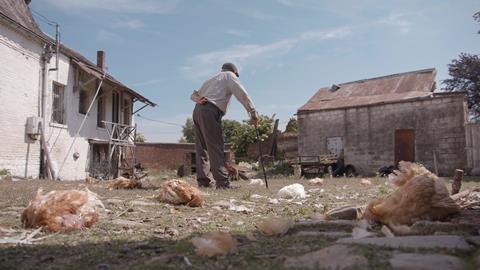French farming documentary debut blurs the lines between fiction and reality with strange results

Dir/Scr: Morgane Dziurla-Petit. Sweden. 2022. 100 minutes
A filmmaker’s farming family is refracted through a fictionalised prism in Morgane Dziurla-Petit’s ambitiously strange feature debut Excess Will Save Us. Showing in the Tiger Competition at online-only Rotterdam before bowing physically at Gothenburg, this Swedish-produced chronicle of rural France’s charms and dysfunctions plays like a slightly more dour cousin of Bruno Dumont’s P’tit Quinquin. The results are about as even as a freshly ploughed field, but festivals on the lookout for emerging talent and unusual narrative approaches should certainly check it out.
The director maintains an engaging pace over 100 minutes
The film shares its title with — and begins with a slightly edited replay of — Dziurla-Petit’s 2019 short, which was more squarely documentary in approach and enjoyed considerable success after premiering at Clermont-Ferrand. The 14-minute short’s selection for and exposure at the latter event actually becomes part of the narrative here, with the its self-described “star,” middle-aged attention-seeker Patrick Petit, travelling to the festival with his new fiancee Marie-Christine Carlier to bask in the limelight.
In the feature-length version, buffoonish Patrick is one of three sons of ancient patriarch Roger, who for decades has farmed in Villereau — a village of less than 1000 inhabitants near the Belgian border, close to Valenciennes. Patrick’s brothers here are the little-seen, older Bernard (who harbours fanciful political ambitions) and the more prominent Fabrice, an alcoholic widower.
This Fabrice is in fact an entirely fictional character, played in hangdog, careworn style by long-established Belgian performer Jean-Benoit Ugeux. Dziurla-Petit has also conjured herself a fictional teenage cousin, Faustine, who gradually emerges as the central figure of the ensemble via a compelling performance by promising newcomer Kim Truong.
Dziurla-Petit further muddies meta-levels and categorisation considerations by popping up intermittently as a version of herself, a Swedish-based filmmaker who has returned home to Villereau to craft a portrait of her close kin. Across the picture’s seven numbered chapters (the short, chapter one, becomes a prologue entitled ’The Attack’), some sequences are presented as factual; others abandon any semblance of documentary and are unambiguously scripted episodes.
The director shows considerable flair when allowing herself an occasional stylistic flourish (such as a striking 360-degree slow motion pan around a dining table); she likewise skilfully interpolates music cuts which range from classics (Brahms, Strauss, Wagner) to, most evocatively, Bing Crosby’s standard ’Red Sails in the Sunset’. Dziurla-Petit weaves in enigmatic, poetic, dream-like touches — interludes which deliberately sit incongruously alongside the observational scenes of family-farm life, with their knockabout humour, petty bickerings and fleeting, casual xenophobia. The latter comes to the fore via another fictional character, Faustine’s Moroccan-French boyfriend Ahmad (Aimen Derriachi), whom she occasionally visits in the nearest big city, Lille.
Intelligent and social-media-savvy, TikTok-devotee Faustine increasingly desires to escape the confines of her traditionally-minded, agriculture-oriented male-dominated family — her mother Eve was killed in a mysterious fire some years before (this event a major recurring element in the film’s chronologically slippery frames of reference), her grandmother more recently deceased. Faustine’s independent streak and her warm bond with her ’escapee’ cousin Morgane gives the film a crucial core of sympathy and emotion, which prevents the work becoming just another tricksy exercise in manipulating formats — “it’s neither a fiction nor a documentary!” as Dziurla-Petit somewhat superfluously informs us via straight-to-camera address in the closing moments.
Working with experienced editors Patrik Forsell and Carl Javer, the director maintains an engaging pace over 100 minutes, even if her control of tone and mood can sometimes be wayward. Then again, the title perhaps is a clue that such volatility is a creative stratagem rather than a symptom of inexperience. If there is an example of excess paradoxically going too far here, it’s the amount of screen-time afforded to Patrick — a little of whose infantile, larger-than-life boisterousness goes a rather long way.
Production company: Vilda Bomben Film AB
International sales: Cinephil, info@cinephil.com
Producer: Fredrik Lange
Editing: Patrik Forsell, Carl Javer
Cinematography: Filip Lyman
Main cast: Kim Truong, Patrick Petit, Jean-Benoit Ugeux, Roger Petit, Marie-Christine Carlier, Morgane Dziurla-Petit, Bernard Petit















![[L-R]: Amanda Villavieja, Laia Casanovas, Yasmina Praderas](https://d1nslcd7m2225b.cloudfront.net/Pictures/274x183/6/4/1/1471641_pxl_20251224_103354743_618426_crop.jpg)








